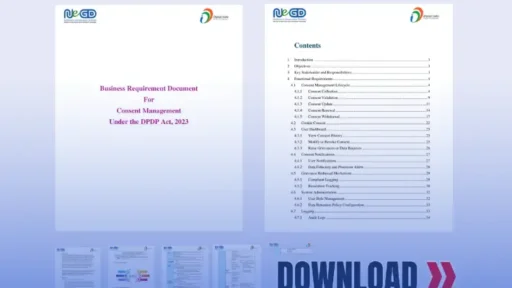India’s healthcare sector is witnessing a significant digital transformation, and from video consultations to AI-powered diagnostics, numerous startups are reconsidering the way people are able to access and experience healthcare. However, as more of patients’ data goes online, so too are concerns for data protection rising.
Introducing the Digital Personal Data Protection Act (DPDPA), 2023. This act makes it compulsory to obtain clear, purpose-specific and revocable consent prior to collecting or using any individual’s personal data.
For healthcare startups, meeting the DPDPA’s standards and obligations is not only an issue of compliance, it is a matter of trust – when patients know their data is being used responsibly, they will be more at ease and encouraged to engage with digital healthcare services. Given the propensity for trust in this sector, it can really be the difference.
In this guide we will look at consent management and list some of the best Consent Management Platforms (CMPs) that are ideal for healthcare startups when complying with DPDPA.
Why Consent Management Is Critical in Healthcare
Healthcare organizations have some of the most sensitive data like medical history, lab reports, prescriptions, etc. Misuse, mishandling, or unauthorized sharing of this data may not only lead to legal ramifications, but it will also result in considerable trust erosion.
Under DPDPA, healthcare startups must:
- Provide clear, user-friendly consent notifications
- Collect anticipated consent information based on the purpose of data collecting
- Allow users to withdraw a user-based or change their consent at any time
- Maintain permanent, tamper-free logs of all consent actions
- Enable user access to their consent history and any recent updates to their consent including updates
Doing this all manually can be difficult and inefficient, particularly as your startup scales. This is the time when a Consent Management Platform becomes a necessity.
Key Features to Look for in a CMP
When selecting a consent platform, healthcare startups should consider the following features:
- DPDPA Compliance: The platform needs to be compliant with the law in terms of all requirements on the Act including granular consent, consent revocation, and secure logs.
- Healthcare Data Support: Capacity to manage sensitive data, e.g. electronic health records (EHR), teleconsultation data, or lab results.
- Easy Integration: The capacity to integrate seamlessly with current systems, e.g. CRMs, patient apps or EMRs.
- Multilingual Support: Consent notices should be available in an Indian languages to ensure patient comprehension.
- Audit Trails: The system should track each consent activity in a verifiable, timestamped format.
- User Dashboard: Patients should have the ability to view, amend or withdraw consents in an easy manner.
Best Consent Platforms for Healthcare Startups
Based on industry reviews, legal compliance requirements, and healthcare-specific, here are five CMPs that are well-suited for healthcare startups under DPDPA in India:
1. Concur Consent Manager
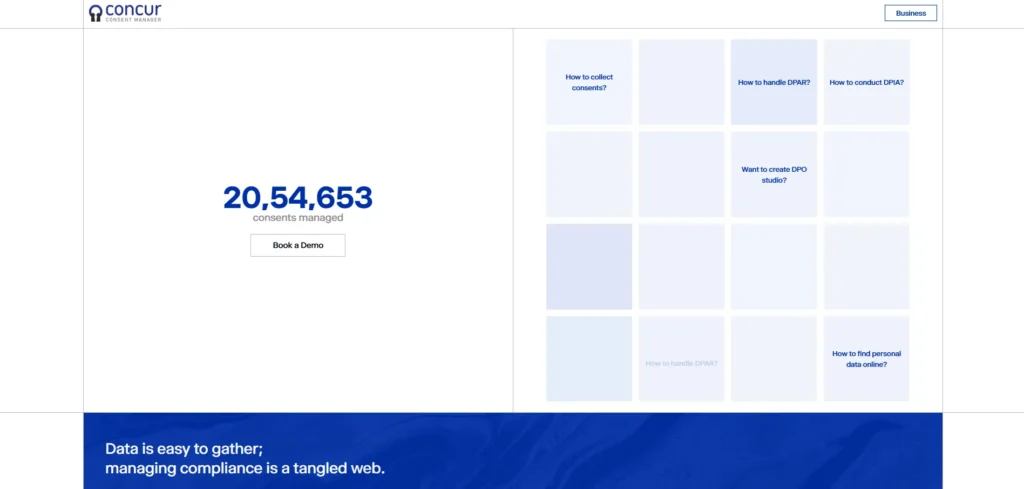
What it offers:
Concur is a plug-and-play Consent Management Platform built specifically for Indian data regulations and DPDPA. It allows healthcare startups to launch compliant consent workflows across web, mobile services without needing in-house developers. With a no-code dashboard, multilingual support, and automated audit logging, Concur helps even lean teams stay compliant with ease.
Key Benefits:
- Real-time consent tracking with a user-friendly dashboard
- Timestamped audit logs that meet DPDPA’s audit trail requirements
- Affordable plans suited for startups and growing teams
- No-code setup for deploying consent forms, popups, and banners in minutes
- Multilingual and accessible across devices
- Built-in consent revocation and expiry management
- Easily integrates with existing patient portals, apps, or CRM systems
Best For:
Startups looking for a quick, budget-friendly solution to manage consent without building custom systems. Ideal for small teams, early-stage digital health platforms, and those needing fast deployment with full legal coverage under Indian data privacy laws.
2. Consee
What it offers:
Consee is a CMP specifically designed to align with Indian data protection regulations. It provides centralized consent handling across web and mobile platforms, with easy integration for various healthcare services.
Key Benefits:
- Multilingual consent forms for broader reach
- Centralized dashboard for managing and tracking user consents
- Consent revocation and expiry management
- Secure, exportable audit trails
- Parental consent handling for minors with document validation
Best For:
Startups that need a DPDPA-ready platform with flexible workflows and language support, especially in multilingual regions or family-oriented services.
3. CoTrust
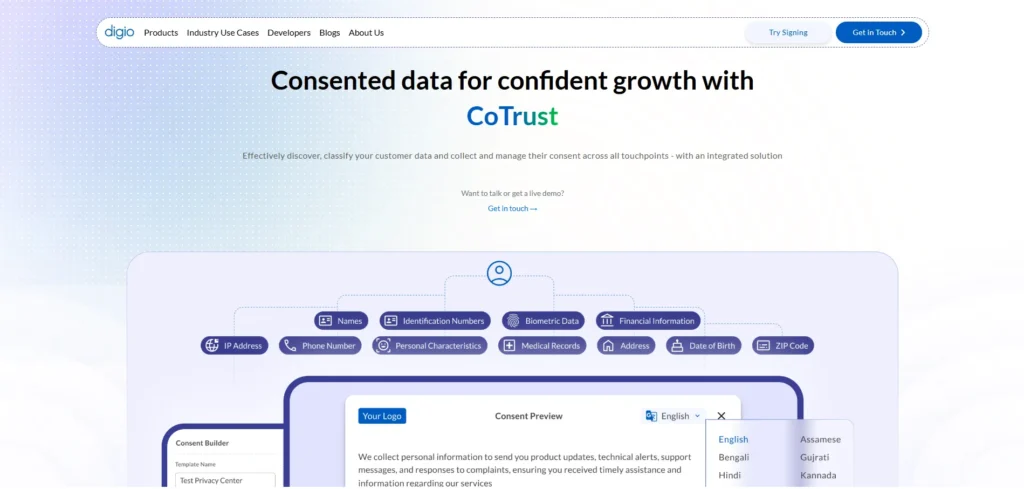
What it offers:
CoTrust is a modular consent platform that allows organizations to embed consent flows into websites, apps, and patient portals without friction. It offers purpose-specific consent templates and supports automation across data lifecycle events.
Key Benefits:
- Embedded consent collection via SDK and APIs
- Multi-language consent templates
- Central dashboard to track and respond to data access and correction requests
- Automated consent reminders and lifecycle workflows
- Integration with existing systems like EMRs and patient apps
Best For:
Startups that want seamless consent experiences inside mobile apps and digital health systems, while meeting all DPDPA compliance needs.
4. GoTrust
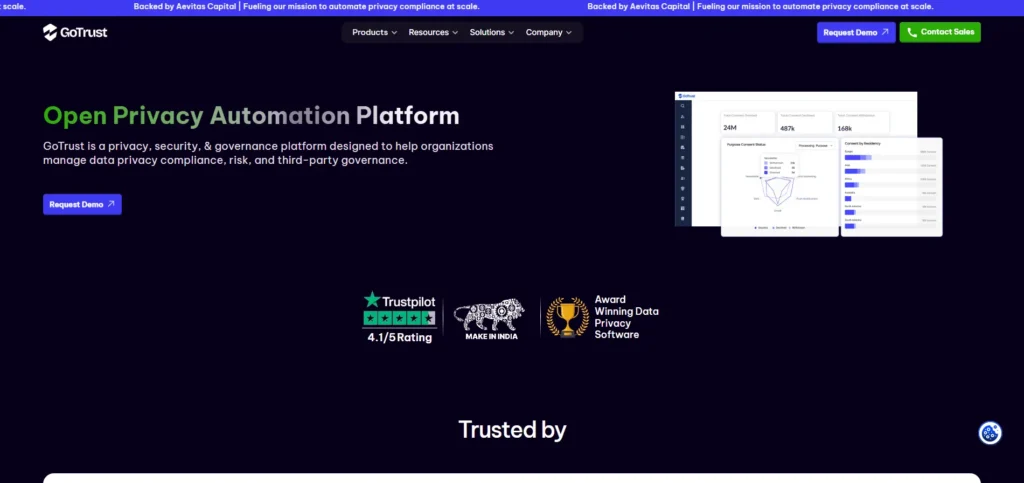
What it offers:
GoTrust is built for healthcare startups that serve mobile-first users, especially in remote or rural areas. It delivers smooth, low-bandwidth performance, and allows consent collection even on basic smartphones. The platform offers location-based customization and flexible consent options that work well in underserved regions.
Key Benefits:
- Mobile-optimized interfaces for low-end devices
- Geo-targeted language selection for better understanding
- Real-time consent dashboards for clinics and doctors
- Easy consent revocation through SMS or app prompts
- Works offline and syncs when connected
- Fully compliant with DPDPA and healthcare standards
Best For:
Startups operating in rural, semi-urban, or low-connectivity areas, or those relying on field agents and mobile clinics. Ideal for teams needing accessible, inclusive, and multilingual consent solutions without complex tech requirements.
5. HyperTrust
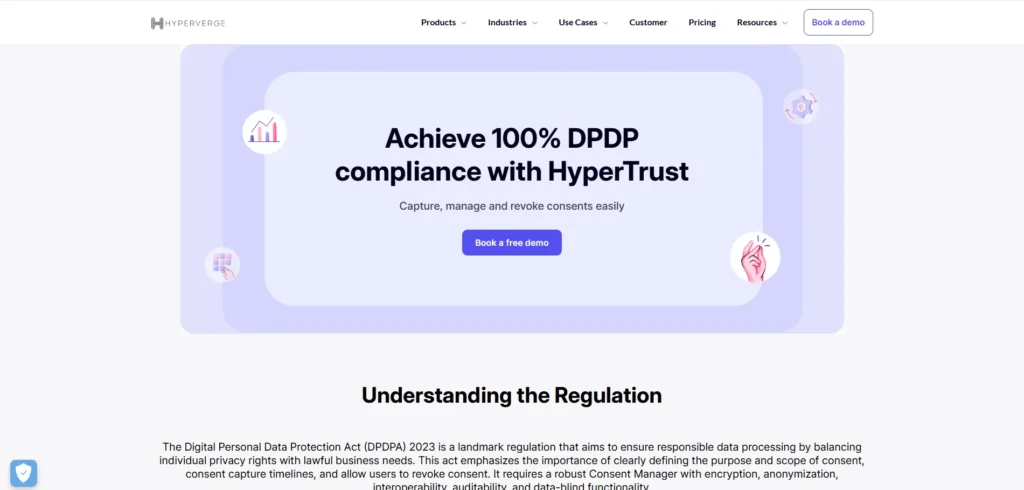
What it offers:
HyperTrust combines identity verification with consent tracking, providing a secure way to link user identities with their data permissions. It’s especially useful in regulated healthcare services where authentication is critical.
Key Benefits:
- Identity-verified consent for medical treatments and diagnostics
- Real-time consent updates with encrypted storage
- Full audit support for regulatory reviews
- Scalable architecture for clinics, hospitals, or telemedicine platforms
- Suitable for services involving prescriptions, lab reports, or sensitive diagnostics
Which CMP Fits Your Healthcare Workflow the Best?
Healthcare platforms that require verified consent linked to identity, such as those providing prescriptions, lab tests, or remote diagnostics.
Start with Concur – Consent Manager, one of the most trusted platforms for healthcare compliance in India. It’s designed specifically for DPDPA and helps you easily manage patient consent with features like real-time tracking, audit-ready logs, and smooth integration with healthcare systems. You can also check for other strong options include GoTrust, Consee, HyperTrust , CoTrust.
When choosing a Consent Management Platform (CMP), think about your patient interaction models, how your systems are set up, and the kind of consent experiences you want to offer. A good CMP doesn’t just help with compliance—it builds trust with your users.
Want to see how Concur and others can work for you?
Let’s talk. Book a demo, explore integration options, and find a CMP setup that fits your startup’s goals and data protection needs.
Disclaimer: This article is intended solely for informational purposes and should not be construed as legal, regulatory, or professional advice. The consent management platforms mentioned herein—specifically for healthcare startups—are listed in alphabetical order, and their inclusion does not imply ranking, rating, endorsement, or certification under the Digital Personal Data Protection Act (DPDPA), 2023, or any healthcare-specific regulation. The information presented is based on publicly available sources and internet research as of the time of writing. Actual product features, compliance capabilities, or availability may vary and may have changed since publication. Readers are strongly encouraged to independently verify details and consult legal, compliance, or data protection professionals before making any implementation or procurement decisions.






